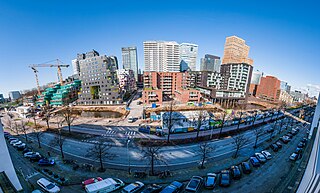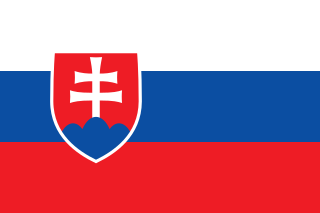
The economy of the Czech Republic is a developed export-oriented social market economy based in services, manufacturing, and innovation that maintains a high-income welfare state and the European social model. The Czech Republic participates in the European Single Market as a member of the European Union, and is therefore a part of the economy of the European Union. It uses its own currency, the Czech koruna, instead of the euro. It is a member of the Organisation for Economic Co-operation and Development (OECD). The Czech Republic ranks 16th in inequality-adjusted human development and 24th in World Bank Human Capital Index, ahead of countries such as the United States, the United Kingdom or France. It was described by The Guardian as "one of Europe's most flourishing economies".

The economy of Denmark is a modern high-income and highly developed mixed economy. The economy of Denmark is dominated by the service sector with 80% of all jobs, whereas about 11% of all employees work in manufacturing and 2% in agriculture. The nominal gross national income per capita was the ninth-highest in the world at $68,827 in 2023.

The economy of Greece is the 54th largest in the world, with a nominal gross domestic product (GDP) of $250.276 billion per annum. In terms of purchasing power parity, Greece is the world's 55th largest economy, at $430.125 billion per annum. As of 2023, Greece is the sixteenth largest economy in the European Union and eleventh largest in the eurozone. According to the International Monetary Fund's figures for 2024, Greece's GDP per capita is $23,966 at nominal value and $41,188 at purchasing power parity. Among OECD nations, Greece has a highly efficient and strong social security system; social expenditure stood at roughly 24.1% of GDP.

The economy of the Netherlands is a highly developed market economy focused on trade and logistics, manufacturing, services, innovation and technology and sustainable and renewable energy. It is the world's 18th largest economy by nominal GDP and the 28th largest by purchasing power parity (PPP) and is the fifth largest economy in European Union by nominal GDP. It has the world's 11th highest per capita GDP (nominal) and the 13th highest per capita GDP (PPP) as of 2023 making it one of the highest earning nations in the world. Many of the world's largest tech companies are based in its capital Amsterdam or have established their European headquarters in the city, such as IBM, Microsoft, Google, Oracle, Cisco, Uber, Netflix and Tesla. Its second largest city Rotterdam is a major trade, logistics and economic center of the world and is Europe's largest seaport. Netherlands is ranked fifth on global innovation index and fourth on the Global Competitiveness Report. Among OECD nations, Netherlands has a highly efficient and strong social security system; social expenditure stood at roughly 25.3% of GDP.

The economy of Europe comprises about 748 million people in 50 countries.

The economy of the European Union is the joint economy of the member states of the European Union (EU). It is the second largest economy in the world in nominal terms, after the United States, and the third largest at purchasing power parity (PPP), after China and the US. The European Union's GDP is estimated to be $19.35 trillion (nominal) in 2024 or $26.64 trillion (PPP), representing around one-sixth of the global economy. Germany has the biggest national GDP of all EU countries, followed by France and Italy.

The Corruption Perceptions Index (CPI) is an index that ranks countries "by their perceived levels of public sector corruption, as determined by expert assessments and opinion surveys." The CPI generally defines corruption as an "abuse of entrusted power for private gain". The index is published annually by the non-governmental organisation Transparency International since 1995.

Aart Jan de Geus is a retired Dutch politician of the Christian Democratic Appeal (CDA) party and businessman. He served as Minister of Labor and Social Affairs from 2002 to 2007. Then he worked as Deputy Secretary-General for the OECD. From 2012 to 2019, De Geus was Chairman and CEO of the Bertelsmann Stiftung. Since January 2020, he has been Chairman of the Goldschmeding Foundation.

The economy of Sweden is a highly developed export-oriented economy, aided by timber, hydropower, and iron ore. These constitute the resource base of an economy oriented toward foreign trade. The main industries include motor vehicles, telecommunications, pharmaceuticals, industrial machines, precision equipment, chemical goods, home goods and appliances, forestry, iron, and steel. Traditionally, Sweden relied on a modern agricultural economy that employed over half the domestic workforce. Today Sweden further develops engineering, mine, steel, and pulp industries, which are competitive internationally, as evidenced by companies such as Ericsson, ASEA/ABB, SKF, Alfa Laval, AGA, and Dyno Nobel.
The Sustainable Governance Indicators (SGI), first published in spring 2009 and updated in 2011, analyze and compare the need for reform in Organisation for Economic Co-operation and Development (OECD) member countries, as well as each country's ability to respond to current social and political challenges. The project is designed to create a comprehensive data pool on government-related activities in the countries considered the world's most developed free-market democracies. In addition, it uses international comparisons to provide evidence-based input for reform-related public discourse taking place in these countries. The SGI are updated every two or three years.
Canada ranks among the highest in international measurements of government transparency, civil liberties, quality of life, economic freedom, education levels, gender equality, public services, public security and environmental sustainability. It ranks among the lowest of the most developed countries for housing affordability, healthcare services and foreign direct investment.
The development of the European Lifelong Learning Indicators (ELLI) is an initiative of the non-profit Bertelsmann Stiftung to monitor the state of lifelong learning in Europe. The main focus of the ELLI project is the ELLI Index. The ELLI index is an annually updated composite indicator summarizing the state of lifelong learning for European countries. The ELLI IT platform is an online portal that provides access to regional data related to learning and socio-economic outcomes in Europe.
The OECD Better Life Index, created in May 2011 by the Organisation for Economic Co-operation and Development, is an initiative pioneering the development of economic indicators which better capture multiple dimensions of economic and social progress.
Although for many decades, it was customary to focus on GDP and other measures of national income, there has been growing interest in developing broad measures of economic well-being. National and international approaches include the Beyond GDP programme developed by the European Union, the Better Lives Compendium of Indicators developed by the OECD, as well as many alternative metrics of wellbeing or happiness. One of the earliest attempts to develop such an index at national level was Bhutan's Gross National Happiness Index and there are a now a number of similar projects ongoing around the world, including a project to develop for the UK an assessment of national well-being, commissioned by the Prime Minister David Cameron and led by the Office for National Statistics.

A new measure of expected human capital calculated for 195 countries from 1990 to 2016 and defined for each birth cohort as the expected years lived from age 20 to 64 years and adjusted for educational attainment, learning or education quality, and functional health status was published by The Lancet in September 2018. Latvia had the twenty-first highest level of expected human capital with 23 health, education, and learning-adjusted expected years lived between age 20 and 64 years.

Corruption in Albania is a very serious problem. According to Global Corruption Barometer 2013, 66% of respondents indicated that level of corruption has increased in Albania.

Corruption in Sweden has been defined as "the abuse of power" by Swedish National Council for Crime Prevention (Brå). By receiving bribes, bribe takers abuse their position of power, which is consistent with how the National Anti-Corruption Unit of the Swedish Prosecution Authority specifies the term. Although bribes and improper rewards are central in the definition of corruption in Sweden, corruption in the sense of "abuse of power" can also manifest itself in other crimes such as misuse of office, embezzlement, fraud and breach of trust against a principal.

Corruption in Latvia is examined on this page.

Corruption in Slovakia is a serious and ongoing problem.

The Bertelsmann Transformation Index (BTI) is a measure of the development status and governance of political and economic transformation processes in developing and transition countries around the world. The BTI has been published biennially by the Bertelsmann Stiftung since 2005, most recently in 2022 on 137 countries. The index measures and compares the quality of government action in a ranking list based on self-recorded data and analyzes successes and setbacks on the path to constitutional democracy and a market economy accompanied by sociopolitical support. For this purpose, the "Status Index" is calculated on the general level of development with regard to democratic and market-economy characteristics and the "Management Index" on the political management of decision-makers.














